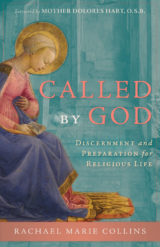By Rachael Marie Collins
Rachael Marie Collins was an Associate (judicial clerk) at the High Court of Australia and was admitted to the bar in New York where she worked for Clifford Chance L.L.P. She is the author of Called by God: Discernment and Preparation for Religious Life.

One of the reasons it took me so long to discern my vocation was that I was constantly looking for absolute certainty about whether or not I was called. I was told to consider whether I was “called” but I wasn’t sure what that “calling” looked or felt like. I was told to seek out the deepest desires of my heart—that my true vocation would satisfy me in a way that the other options would not. But I wasn’t sure how to identify the deepest desires of my heart.
It was extremely difficult for me to discern anything. My confessor did not think I had a vocation to religious life. Two mother superiors thought I probably did have a vocation. My parish priest was sure I was called to religious life. My parents hoped I didn’t have a vocation. As for me, I was constantly unsure, swinging from one direction to the other in a most undisciplined fashion.
While I really did desire to enter religious life and was willing to enter should it be God’s will for me, the methodology I used to discern was seriously flawed. It is unfortunate that the modern approach to discernment encourages young women to focus on their subjective and inconsistent feelings and desires. This is not advisable.
First, our emotions and desires—especially those that are unexamined or superficial—tend to be changeable. They are affected by our imagination and moods. An unpurified, immature imagination, for example, can distort our ability to see things (including ourselves) accurately. This is why it is so important to monitor our intake of media—especially magazines, pop music, and television programs—which can influence the way we feel, imagine, or think about important things such as love, marriage, sex, and God. Overcoming a tendency towards sentimentality will help you with this.
Second, marriage is a natural vocation while religious life is a supernatural vocation. By this I mean that our natural inclination is to want marriage. We tend to desire the companionship and joy a spouse and children can bring. Because it is necessary for a properly ordered civil society, marriage has had a long and widespread existence. Marriage existed before Christ was born; it continues to exist in neo-pagan cultures now.
In other words, marriage doesn’t depend on faith in God or a particular, special calling from God in the way that a religious vocation does. Yes, Christ did make marriage a sacrament. It is a beautiful means of obtaining sanctity; but this does not change the fact that marriage is also the natural default to which most of us gravitate. It is simply part of how we are built. The religious life is naturally less attractive because it involves a radical death to self from the very beginning. Marriage also involves a great death to self—it just happens more slowly and is less obvious at the start. Having a spouse and raising children is hard work. To do it well means much sacrifice and constant self-denial for the sake of others. Even in a happy, Christian marriage, one must endure suffering: we cannot avoid the Cross.
When Saint Teresa of the Andes finished school, she remained at home and helped her mother serve the family and manage the home for several months before entering religious life. She had not expected domestic life to be as taxing as she found it. For her it became a painful form of self-abnegation:
“When I first left school, I thought, Rev. Mother, I’d have a little more free time and that I would write you more often. But just the opposite has happened. Believe me, when I say that I don’t have a free moment. Now it’s one thing, then another, keeping me constantly occupied. . . . The resolution I made on my retreat was to sacrifice myself for everyone. How much the continuous sacrifice costs at times.
One important consequence of all this is that you can, and sometimes should, choose against the natural inclination to marriage. In other words, a desire for and attraction to marriage doesn’t rule out that one is also called to religious life. Don’t give any significance to superficial feelings or desires. When you do examine your feelings and emotions, focus on these two things: (a) your conscience, and (b) which option gives you the greatest sense of peace—not excitement, passion, or short-lived certainty, but peace.
You Might Also Like

In Called by God: Discernment and Preparation for Religious Life, Rachael Marie Collins provides an overview of the spiritual life—both its joys and its challenges—and guides women as they discern whether they are called to be religious sisters or nuns.